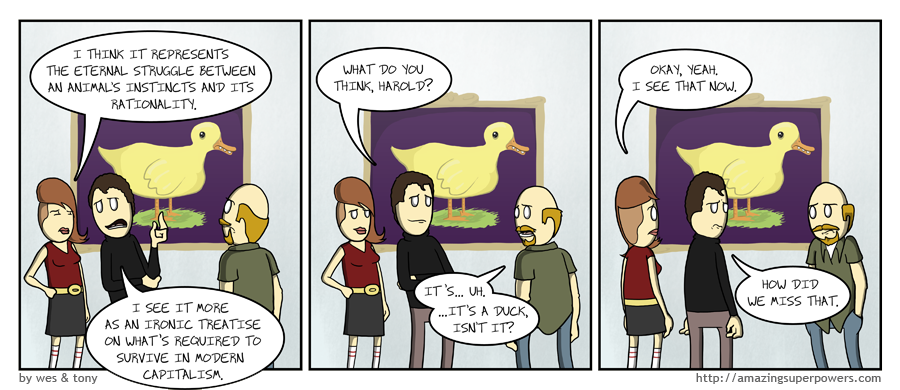Actually I didn't ask. I merely pointed out that I didn't know how the US "Justice" *Again sarcastic air quotes around 'justice'* System's defined theft, I didn't actually ask to be informed of what it was.Iron Lightning said:Well, since you asked, here is the legal definition of theft:canadamus_prime said:Well gee, I was on under the impression that the definition of stealing and therefore theft was the taking of things that don't belong to you without permission of the owner nor the intention of returning them. The fact that the data involved was copied and not removed is irrelevant, he still took stuff that doesn't belong to him without permission and without the intention of returning it. Now I don't know how the US "Justice" *sarcastic air quotes around 'justice'* system defines stealing, but in my mind this guy still stole things. Also I was under the very distinct impression that piracy=stealing. That impression heavily re-enforced by many an Escapist topic regarding the issue.Iron Lightning said:No, no, no, piracy is not equivalent to theft. Let's elaborate on your simile to demonstrate this.canadamus_prime said:But we're not talking about copyright infringement, we're talking about THEFT. He's openly admitted to stealing $5 million dollars worth of software and put it on display for all to see and nobody is going to arrest him??? I would've thought that the companies behind some of that software would've been all over him like white on rice, with the lawyer brigade in tow.Iron Lightning said:Because copyright infringement is a civil matter and not a criminal offense. It's like breach of contract in that you can get sued for it but not arrested.canadamus_prime said:Error 404: Art Not Found.
Also why was this guy not arrested?
More on Topic: Of course this is art. It's kind of a paradox that something that costs $5 million dollars can have so little value. He "stole" 5 million dollars without taking a dime from anyone.
Edit: This is like if someone broke in to your house and stole your couch and then put the couch on display and said "Look, art!"
If you were to take my couch from me then I would have one less couch and you would have one more couch. That would be theft.
If you had a device that could make an exact duplicate of my couch without harming my couch then I would not lose my couch and you would have one more couch. That would be piracy. The only theoretical problem with this sort of action is that the couchmakers might want you to pay for the couch that they designed and thus have the right to copy (or copyright.)
Although, you are probably correct that this is a criminal offense. I did more research into U.S. copyright law and found that it is a criminal offense to reproduce copies of copyrighted material over a 180 day period which are worth $1000 or more (see: http://www.copyright.gov/title17/92chap5.html#506 and/or http://www.law.uh.edu/faculty/gmoohr/Criminal.pdf .)
One could make the argument that since the information stored on this hard drive has not been used it would technically not be copyright infringement or perhaps that the work itself is an original creation that doesn't violate copyright infringement. I'm no lawyer but I can see that this case is not quite open-and-shut, that is, if anyone should decide to press charges.
Nevertheless invocation of the criminal aspects of copyright law is fairly rare (again, see: http://www.law.uh.edu/faculty/gmoohr/Criminal.pdf for an indication of general trends, sorry I do not have any studies that show this ratio directly) and the majority of cases remain civil matters. The police have better things to do than to start arresting copyright infringes en masse (we're already the country with the most prisoners per capita, no need to start arresting more minor criminals.)
I expect that the reason no corporations or companies seem to want to sue our artistic friend is to preserve their image. Any corporation or company seen beating up on this small-time artist would lose a lot of face and therefore lose a lot more money from lost sales than whatever they could soak out of this likely not-wealthy gentleman.
Note the bolded section. Piracy isn't theft as the victim is not deprived of anything. Piracy is copyright infringement, i.e. a violation of the right of the owner to decide who gets to copy his data. The fact the data is copied and not physically removed is certainly relevant.http://criminal.findlaw.com/crimes/a-z/theft_larceny.html?CRIM_Robbery-TheftDefine&HBX_PK=legal+definition+of+theft said:Theft/larceny is typically defined as the taking of almost anything of value without the consent of the owner, with the intent to permanently deprive him or her of the value of the property taken. Most states recognize degrees of theft, such as "grand" or "petty," which usually relate to the value of the property taken.
For example, Dan goes to Victor's music store, puts two CDs in his pocket, and walks out the door. Dan can be charged with theft/larceny. Had Dan stolen Victor's car from the parking lot, Dan would likely be charged with grand theft/larceny.
If my car gets stolen I am one car poorer. If my car gets copied then I am not one car poorer. Sure, if I was selling cars and one of my cars got copied then I potentially lost a sale. However, I did not certainly lose a sale as the copier probably couldn't afford to buy my car if he was out copying them. Even if I did lose a sale, it would be indistinguishable from an individual simply not choosing to purchase one of my cars. Whereas if one of my cars was stolen then I would lose actual property instead of potential revenue.
But since you felt obligated to tell me anyway, I think that maybe the definition of theft needs to be re-evaluated or maybe software piracy should be a criminal offense unto itself, buy equal to theft. Either way, prosecuting it as copyright infringement is bullshit and I imagine it infuriates more than a few software companies.


